人教版英语英语动词的时态难点、易错点含答案百度文库
- 格式:doc
- 大小:73.00 KB
- 文档页数:13
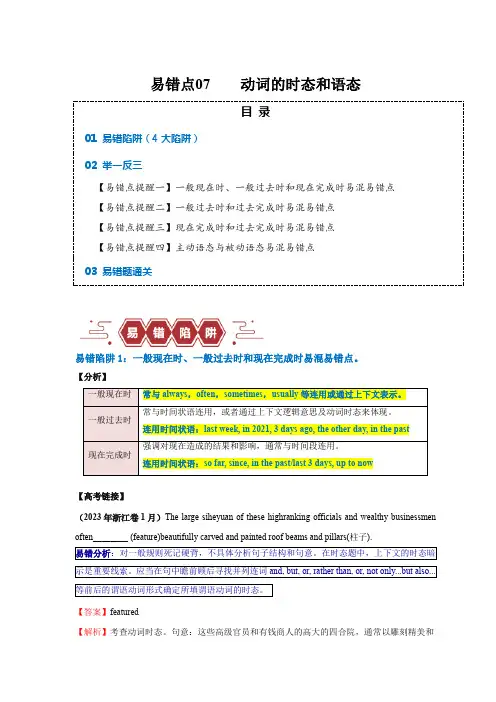
易错点07 动词的时态和语态目录01 易错陷阱(4大陷阱)02 举一反三【易错点提醒一】一般现在时、一般过去时和现在完成时易混易错点【易错点提醒二】一般过去时和过去完成时易混易错点【易错点提醒三】现在完成时和过去完成时易混易错点【易错点提醒四】主动语态与被动语态易混易错点03 易错题通关易错陷阱1:一般现在时、一般过去时和现在完成时易混易错点。
【分析】【高考链接】(2023年浙江卷1月)The large siheyuan of these highranking officials and wealthy businessmen often________ (feature)beautifully carved and painted roof beams and pillars(柱子).【答案】featured【解析】考查动词时态。
句意:这些高级官员和有钱商人的高大的四合院,通常以雕刻精美和被粉刷的房顶横梁和柱子为特点。
分析句子结构可知,空格处需要填谓语动词,再结合and后动词时态可知,空格处应用一般过去时。
故填featured。
易错陷阱2:一般过去时和过去完成时易混易错点。
【分析】1.下列动词hope、wish、expect、think、intend、mean、suppose等,用过去完成时表示“原本……(事实上未能……)”。
2.This/It/That was the first/second/third ... time that ...表示“这/那是(某人)第几次做某事”,that从句中要用过去完成时。
3.hardly ... when ...和no sooner ... than ...两个句型中,主句均用过去完成时。
易错陷阱3:现在完成时和过去完成时易混易错点。
【分析】易错陷阱4:主动语态和被动语态易混易错点。
【分析】➢受母语干扰,翻译上下文时混淆被动语态与主动语态。
➢混淆谓语动词被动语态构词be+done与非谓语动词重点过去分词done。

pep小学英语六年级上册易错题时态、三单、ing时态易错题一、一般现在时:主语+动词原形或动词三单+多次发生的时间(如频度副词always usually often sometimes on Mondays) 动词原形变三单规则:1.一般情况下直接加s。
2.以s/x/ch/sh/o结尾的动词加es。
3.以元音字母+y结尾的动词直接加s。
(元音字母有a/e/i/o/u)以辅音字母+y结尾的动词变y为i加es。
4.以f/fe结尾的动词变f/fe为v加es。
(仅了解)5.特殊:have的三单是has二、现在进行时:主语+be+动词ing+表示现在的时间(如now,look,listen)动词原形变动词ing的规则:1、一般情况直接加ing。
2、以不发音的e结尾的去e加ing。
3、双写最后一个辅音字母加ing:run-running,swim-swimming,shop-shopping,get-getting,sit-sitting,cut-cutting,win-winning三、一般将来时:主语+be going to +动词原形+将来时间主语+will+动词原形+将来时间(如tomorrow /this morning/this... /next week/next.../one day )一、写出下列单词的第三人称单数及动词ing形式。
1、buy _______ ________2、clean_______ ________3、help_______ ________4、find_______ ________5、pass_______ ________6、try_______ ________7、get_______ ________8、come_______ ________9、fly_______ ________10、love_______ ________11、eat_______ ________12、pack_______ ________13、wait_______ ________14、speak_______ ________15、finish_______ ________16、wash_______ ________17、watch_______ ________18、do_______ ________ 19、read_______ ________20、play_______ ________21、sing_______ ________22、dance_______ ________23、draw_______ ________24、cook _______ ________25、swim_______ ________26、learn_______ ________27、study_______ ________28、want _______ ________29、send_______ ________30、live_______ ________31、have_______ ________32、take_______ ________33、make_______ ________34、start_______ ________35、late_______ ________36、need_______ ________37、win_______ ________38、pick_______ ________39、meet_______ ________40、plant_______ ________41、look_______ ________42、climb_______ ________43、jump_______ ________44、drink_______ ________45、sleep_______ ________46、listen_______ ________47、talk_______ ________48、like_______ ________49、say_______ ________50、teach_______ ________51、catch_______ ________52、see_______ ________53、ask_______ ________54、give_______ ________55、tell_______ ________56、wear_______ ________57、visit_______ ________ 58、join_______ ________59、share_______ ________60、use_______ ________61、type_______ ________62、chase_______ ________63、hurt_______ ________64、hear_______ ________65、worry_______ ________一般现在时一、用单词的正确形式填空:1.Mike _________ (do) his homework every day.2.He _________ (like) swimming.3.We like ________ (play) basketball after class.4.I like singing. I often _________(listen) to the music in the evening.5.My grandma_________(watch) TV every day.二.单选1. ____Alice often play the piano?No, she _____.A.Do; doB. Does; doesC. Does; doesn’t2. ___ your pen pal _____ in Beijing?A. Do; liveB. Do; livesC. Does; live3. Tom and Mike_________very excited, they will take a trip.A. isB. areC. am4. I like ________ very much. What about you?A. danceB. dancedC. dancing5. Bill and I ___ good friends.A. isB. areC. am6. Sandy often ___ his homework on Sundays .A. doB. doesC. did7. What do you usually do on the weekend?I __________.A. went swimmingB. go swimmingC. visited grandparents8. What do you usually do on your holiday?A. saw elephantsB. sing and danceC.took pictures9. I ____ a student. I go to school ____bus every day.A. is; byB. am; onC. am; by现在进行时一、填空。
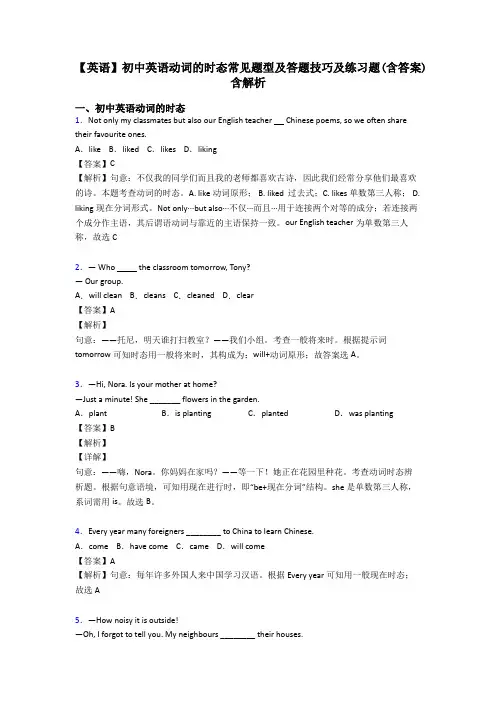
【英语】初中英语动词的时态常见题型及答题技巧及练习题(含答案)含解析一、初中英语动词的时态1.Not only my classmates but also our English teacher Chinese poems, so we often share their favourite ones.A.like B.liked C.likes D.liking【答案】C【解析】句意:不仅我的同学们而且我的老师都喜欢古诗,因此我们经常分享他们最喜欢的诗。
本题考查动词的时态。
A. like动词原形; B. liked 过去式;C. likes 单数第三人称; D. liking现在分词形式。
Not only···but also···不仅···而且···用于连接两个对等的成分;若连接两个成分作主语,其后谓语动词与靠近的主语保持一致。
our English teacher为单数第三人称,故选C2.— Who the classroom tomorrow, Tony?— Our group.A.will clean B.cleans C.cleaned D.clear【答案】A【解析】句意:——托尼,明天谁打扫教室?——我们小组。
考查一般将来时。
根据提示词tomorrow可知时态用一般将来时,其构成为:will+动词原形;故答案选A。
3.—Hi, Nora. Is your mother at home?—Just a minute! She _______ flowers in the garden.A.plant B.is planting C.planted D.was planting【答案】B【解析】【详解】句意:——嗨,Nora。
你妈妈在家吗?——等一下!她正在花园里种花。
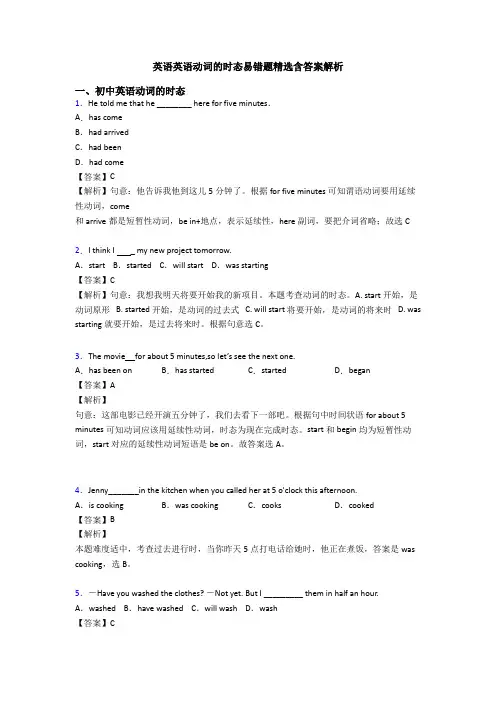
英语英语动词的时态易错题精选含答案解析一、初中英语动词的时态1.He told me that he ________ here for five minutes.A.has comeB.had arrivedC.had beenD.had come【答案】C【解析】句意:他告诉我他到这儿5分钟了。
根据for five minutes可知谓语动词要用延续性动词,come和 arrive都是短暂性动词,be in+地点,表示延续性,here副词,要把介词省略;故选C2.I think I _ my new project tomorrow.A.start B.started C.will start D.was starting【答案】C【解析】句意:我想我明天将要开始我的新项目。
本题考查动词的时态。
A. start 开始,是动词原形 B. started 开始,是动词的过去式 C. will start 将要开始,是动词的将来时 D. was starting就要开始,是过去将来时。
根据句意选C。
3.The movie fo r about 5 minutes,so let’s see the next one.A.has been on B.has started C.started D.began【答案】A【解析】句意:这部电影已经开演五分钟了,我们去看下一部吧。
根据句中时间状语for about 5 minutes可知动词应该用延续性动词,时态为现在完成时态。
start和begin均为短暂性动词,start对应的延续性动词短语是be on。
故答案选A。
4.Jenny_______in the kitchen when you called her at 5 o'clock this afternoon.A.is cooking B.was cooking C.cooks D.cooked【答案】B【解析】本题难度适中,考查过去进行时,当你昨天5点打电话给她时,他正在煮饭,答案是was cooking,选B。
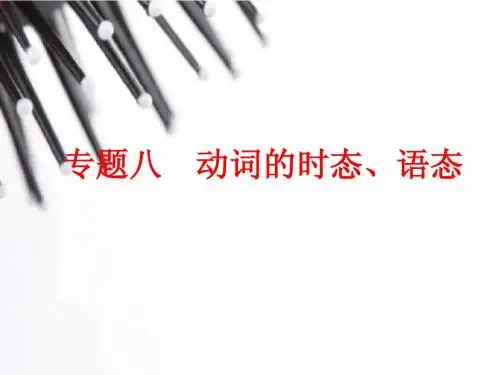
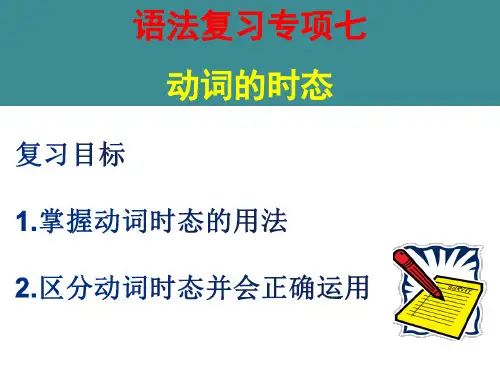
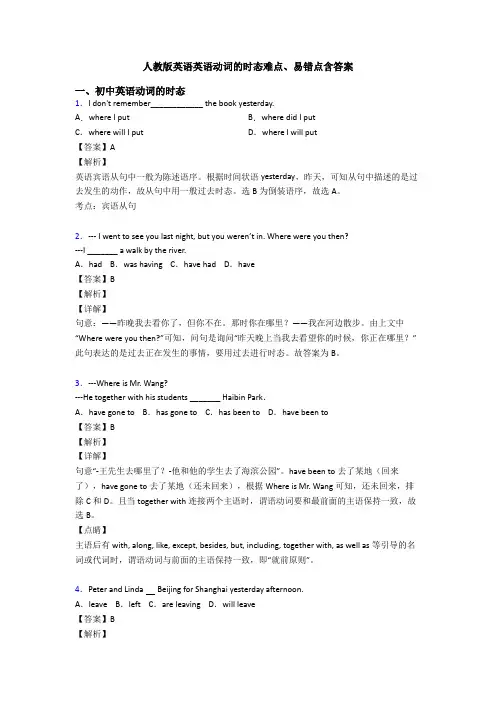
人教版英语英语动词的时态难点、易错点含答案一、初中英语动词的时态1.I don't remember____________ the book yesterday.A.where I put B.where did I putC.where will I put D.where l will put【答案】A【解析】英语宾语从句中一般为陈述语序。
根据时间状语yesterday,昨天,可知从句中描述的是过去发生的动作,故从句中用一般过去时态。
选B为倒装语序,故选A。
考点:宾语从句2.--- I went to see you last night, but you weren’t in. Where were you then?---I _______ a walk by the river.A.had B.was having C.have had D.have【答案】B【解析】【详解】句意:——昨晚我去看你了,但你不在。
那时你在哪里?——我在河边散步。
由上文中“Where were you then?”可知,问句是询问“昨天晚上当我去看望你的时候,你正在哪里?”此句表达的是过去正在发生的事情,要用过去进行时态。
故答案为B。
3.---Where is Mr. Wang?---He together with his students _______ Haibin Park.A.have gone to B.has gone to C.has been to D.have been to【答案】B【解析】【详解】句意“-王先生去哪里了?-他和他的学生去了海滨公园”。
have been to去了某地(回来了),have gone to去了某地(还未回来),根据Where is Mr. Wang可知,还未回来,排除C和D。
且当together with连接两个主语时,谓语动词要和最前面的主语保持一致,故选B。
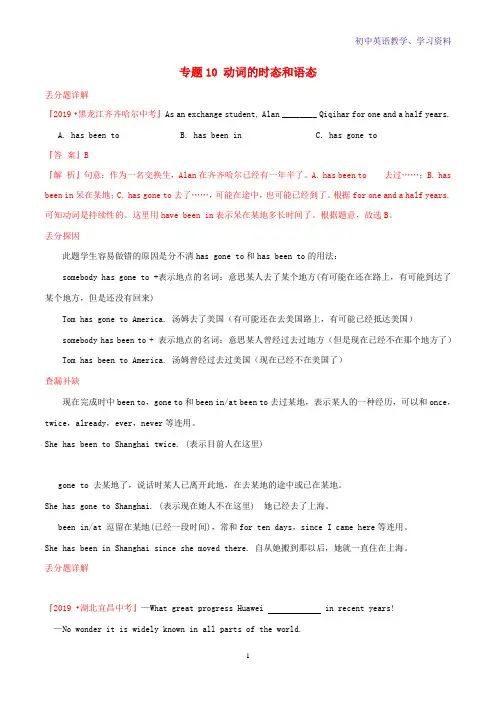
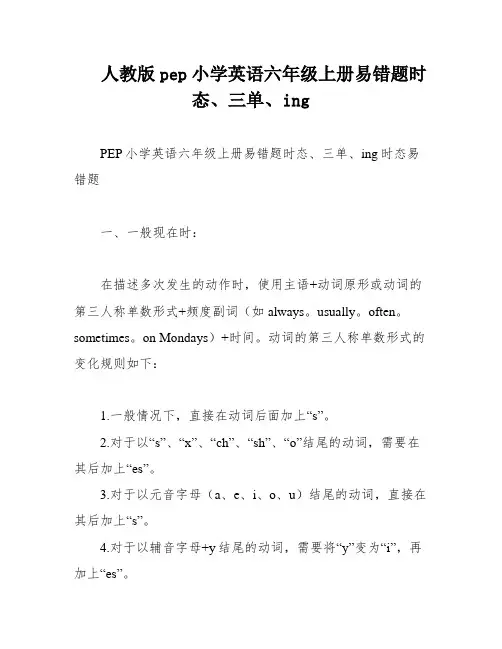
人教版pep小学英语六年级上册易错题时态、三单、ingPEP小学英语六年级上册易错题时态、三单、ing时态易错题一、一般现在时:在描述多次发生的动作时,使用主语+动词原形或动词的第三人称单数形式+频度副词(如always。
usually。
often。
sometimes。
on Mondays)+时间。
动词的第三人称单数形式的变化规则如下:1.一般情况下,直接在动词后面加上“s”。
2.对于以“s”、“x”、“ch”、“sh”、“o”结尾的动词,需要在其后加上“es”。
3.对于以元音字母(a、e、i、o、u)结尾的动词,直接在其后加上“s”。
4.对于以辅音字母+y结尾的动词,需要将“y”变为“i”,再加上“es”。
5.对于以“f”或“fe”结尾的动词,需要将其变为“v”,再加上“es”(仅了解)。
6.特殊情况:have的第三人称单数形式为has。
二、现在进行时:在描述正在进行的动作时,使用主语+be动词+动词的ing 形式+表示现在的时间(如now。
look。
listen)。
动词的ing 形式的变化规则如下:1.一般情况下,直接在动词后面加上“ing”。
2.对于以不发音的“e”结尾的动词,需要去掉“e”,再加上“ing”。
3.对于以双写的最后一个辅音字母结尾的动词,需要将其改为单写,再加上“ing”(如run-running,swim-swimming,shop-shopping,get-getting,sit-sitting,cut-cutting,win-winning)。
三、一般将来时:在描述将来要发生的动作时,可以使用主语+be going to+动词原形+将来时间或者主语+will+动词原形+将来时间(如tomorrow。
this morning。
this。
next week。
next。
one day)。
练:将下列动词转化为第三人称单数形式和ing形式:1.buy – buys。
XXX2.clean – cleans。

(英语)英语动词的时态常见题型及答题技巧及练习题(含答案)及解析一、初中英语动词的时态1.--I didn't see you at Olympic Sports Centre this morning. What happened?-- Sorry, I the exchange students around our school then.A.showed B.was showing C.am showing D.will show【答案】B【解析】句意:——今天早上我在奥运会体育中心没有看见你。
发生了什么?——对不起,我那时正领着交换生参观我们学校。
根据时间副词then可知此处用过去进行时,故选B。
2.Her son Coke, but now he milk.A.used to drink; is used to drinking B.used to drinking; drinksC.is used to drinking; used to drink D.was used to drink; is drinking【答案】A【解析】【详解】句意:她儿子过去常喝可乐,但现在他习惯喝牛奶。
used to do过去常常做;be used to doing sth习惯于做某事;drinks喝,第三人称单数形式;is drinking现在进行时,根据转折词but,可知前句表示过去喝可乐,后句表示习惯于喝牛奶,故选A。
3.—Shall we play tennis now?—Sorry, I can’t. I my homework.A.do B.did C.have done D.am doing【答案】D【解析】句意:——我们现在打网球去好吗?——对不起,我不能去,我在做作业。
A. do 做,用于一般现在时态,主语复数时; B. did做,用于一般过去时态; C. have done 做,用于一般现在完成时态; D. am doing做,用于现在进行时态,主语是I时;根据now可知用现在进行时态,故选D4.I_______this mobile phone online. It is not worth buying.A.check B.am checking C.have checked D.will check【答案】C【解析】【详解】句意:我在网上查过这部手机。
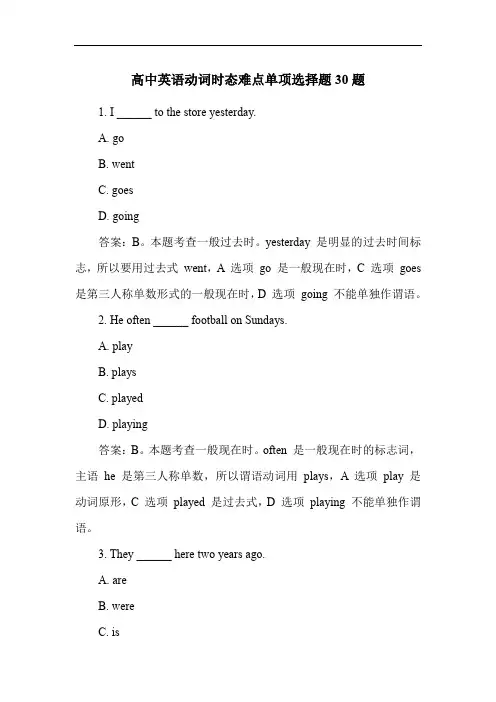
高中英语动词时态难点单项选择题30题1. I ______ to the store yesterday.A. goB. wentC. goesD. going答案:B。
本题考查一般过去时。
yesterday 是明显的过去时间标志,所以要用过去式went,A 选项go 是一般现在时,C 选项goes 是第三人称单数形式的一般现在时,D 选项going 不能单独作谓语。
2. He often ______ football on Sundays.A. playB. playsC. playedD. playing答案:B。
本题考查一般现在时。
often 是一般现在时的标志词,主语he 是第三人称单数,所以谓语动词用plays,A 选项play 是动词原形,C 选项played 是过去式,D 选项playing 不能单独作谓语。
3. They ______ here two years ago.A. areB. wereC. isD. was答案:B。
本题考查一般过去时。
two years ago 是过去时间,主语they 是复数,所以用were,A 选项are 是一般现在时的复数形式,C 选项is 是一般现在时的第三人称单数形式,D 选项was 是一般过去时的第三人称单数形式。
4. She ______ English every day.A. studyB. studiesC. studiedD. studying答案:B。
本题考查一般现在时。
every day 是一般现在时的标志词,主语she 是第三人称单数,所以谓语动词用studies,A 选项study 是动词原形,C 选项studied 是过去式,D 选项studying 不能单独作谓语。
5. We ______ a party last week.A. haveB. hadC. hasD. having答案:B。
本题考查一般过去时。
last week 是过去时间,所以要用过去式had,A 选项have 是一般现在时,C 选项has 是第三人称单数形式的一般现在时,D 选项having 不能单独作谓语。
动词的时态和语态一、知识框架二、知识梳理动词不定式的基本形式是“to+动词原形”有时可以不带to,否定式:not + (to) do。
动词不定式没有人称和数的变化,在句子中不能作谓语,但具有名词、形容词、副词的特征,可以担任主语、表语、宾语、定语、状语和宾语补足语。
动词不定式仍保留动词的一些特点。
一)不定式的句法功能(1)作主语:不定式作主语时,一般表具体的、个别的、一次性的或具有将来意义的动作。
To forgive is the best virtue of life.人生最好的美德是宽恕。
To finish the work in ten minutes is very hard. 十分钟之内完成这项工作是很难的。
To lose your heart means failure. 灰心意味着失败。
若主语较长,常用it作形式主语,真正的主语不定式置于句后,上面两句可用如下形式:It is very hard to finish the work in ten minutes.It means failure to lose your heart.常用句式有:It+be+名词+to doIt takes sb+some time+to doIt+be+形容词+of/for sb +to doHow + adj. + it is + to do sth.!①如果句中的形容词表示人物特征或品质,常同of搭配构成“It is + 形容词+of+代词(名词)+不定式”句型。
如:bold, brave, careful, careless, considerate, cruel, rude, generous, right, wrong, kind, nice, good, polite, clever, wise, foolish, silly等。
②表示事物性质的形容词如easy, difficult, hard, important, impossible, possible, safe, dangerous, necessary常同for 搭配。
(英语)初中英语动词的时态解题技巧分析及练习题(含答案)一、初中英语动词的时态1.In the past few years, many schools ______ the ways of doing morning exercises. A.change B.changes C.will change D.have changed【答案】D【解析】试题分析:句意:在过去的几年里,很多学校已改变了做早操的方式。
根据时间状语In the past few years可知,本题用现在完成时。
故选D。
2.We a few museums while we were in London.A.visit B.visitedC.have visited D.are visiting【答案】B【解析】句意:当我在伦敦时,我参观了几个博物馆。
A. visit 参观,用于一般现在时态,主语复数时; B. visited 参观,用于一般过去时态; C. have visited 参观,用于一般现在完成时态;D. are visiting 参观,用于现在进行时态,主语复数时;根据 while we were in London.可知主句用过去时态;故选B3.—Could you tell me what he said just now?—Sorry, I ___ about what I would do tomorrow.A.will think B.was thinking C.thought D.think【答案】B【解析】【详解】句意:你能告诉我他刚才说什么吗?对不起,我正考虑明天我要做什么。
考查时态。
A. will think(一般将来时);B. was thinking(过去进行时);C. thought (一般过去式);D. think(一般现在时);根据句意,“考虑”这个动作发生刚才在他讲话的时候,在过去某个时间点发生的动作用过去进行时,故选B。
中考英语动词的时态答题技巧及练习题(含答案)一、初中英语动词的时态1.I _______ him the good news as soon as he _______ back.A.will tell, comes B.told, comesC.will tell, will come D.tell, come【答案】A【解析】句意:他一回来,我就告诉他这个好消息。
as soon as“一……就……”,引导的时间状语从句,用一般现在时,主句用一般将来时。
第二空主语he是第三人称单数,故谓语用第三人称单数comes。
故选A。
2.Miss Smith in our school since five years ago.A.teaches B.taught C.has taught D.is teaching【答案】C【解析】句意:Smith小姐从5年前就已经在我们学校教书了。
考查现在完成时。
since five years ago自从五年前以来,意为自从五年前以来他就教我们英语,表示状态的持续,用于现在完成时;现在完成时的构成:主语+have/has+动词过去分词;主语是Miss Smith,所以助动词用has,teach教,实义动词,过去分词是taught,故答案选C。
3.—There are so many swimmers swimming in the swimming pool.—Yes, and sixty percent _ children.A.is B.are C.was D.were【答案】B【解析】句意:——在游泳池里有那么多游泳者正在游泳。
——是的,而且百分之六十是孩子。
根据谓语are可知此处用一般现在时,故排除CD两项。
此处的sixty percent代指的是百分之六十的游泳者,故谓语用复数形式,故选B。
4.—I ________ you at seven and you didn’t pick up.—I was taking a shower at that time.A.call B.calledC.am calling D.have called【答案】B【解析】句意:——我七点钟打电话给你,你没接。
模块三千变万化的动词第4讲动词的时态、语态和主谓一致考点一一般时态1. 一般现在时(do/does;is/am/are)(1)表示经常发生的、习惯性的、反复出现的动作或状态。
常与表示习惯的副词(词组)always,every time,now and then,occasionally,often,seldom,sometimes,usually, every day/night等连用。
(2)按时间表、时刻表、日程表等安排将要发生的动作,用一般现在时。
只限于go,arrive,leave,start,stay,return,begin,come等动词。
(3)普遍真理。
(4)用在时间、条件或让步状语从句中,用一般现在时表示将来。
※He plays basketball every day.※The film starts at two o’clock.※The earth goes round the sun once a year.※(2020·江苏高考)If you look at all sides of the situation, you’ll find probablya solution that suits everyone.2. 一般过去时(did;was/were)(1)表示过去某个时间发生的动作或情况。
(2)表示过去习惯性动作。
点津: would/used to do表示过去常常做……※We used to go there every year.※We often played together when we were children.※—Haven’t seen you for ages! Where have you been?—I went to Ningxia and stayed there for three years, teaching as a volunteer. 考点二进行时态1. 现在进行时(am/is/are doing)(1)表示说话时正在进行或表示现阶段正在进行的动作,虽然此时此刻该动作不一定正在进行。
《人教版初一上英语重难点易错点》作为初一上英语学习的评估者和沟通者,我们将意识到对于初学英语的学生来说,学习新知识和突破难点是一项具有挑战性的任务。
我们需要深入地评估《人教版初一上英语》教材中的重难点和易错点,以便撰写一篇有价值的文章,帮助学生更深入地理解和掌握这些知识。
1. 重点难点梳理在学习初一上英语的过程中,我们发现有几个重点难点需要特别关注。
词汇和语法方面的掌握是基础中的基础,例如一些常见的动词、形容词和副词的用法,以及名词单复数形式的变化规则。
阅读理解和听力训练也是学习过程中的难点,例如需要理解文章中的主旨、细节或推理意义。
写作能力也需要不断地提高,包括句子和段落的连接、逻辑与表达的连贯性等。
2. 分步探讨为了更好地帮助学生理解和掌握这些知识,我们可以按照从简到繁、由浅入深的方式来分步探讨这些重点难点。
我们可以从最基础的词汇和语法开始,例如英语中的常见动词和形容词,以及它们的用法和搭配。
我们可以逐步扩展到阅读理解和听力训练,帮助学生理解不同类型的文章和听力材料。
我们可以关注写作能力,特别是如何合理地组织语言和表达思想。
3. 总结回顾在文章的我们需要对学习初一上英语的重点难点进行总结和回顾。
通过总结,帮助学生全面、深刻地理解这些知识,使他们能够更加灵活地运用到实际的学习和生活中。
总结回顾的我们也可以共享我们对这些知识的个人观点和理解,激发学生的学习兴趣和思考能力。
以上是对《人教版初一上英语重难点易错点》的全面评估和文章撰写的思路。
希望通过这篇文章,能够帮助学生更好地理解和掌握初一上英语的重点知识,提高他们的英语学习能力和水平。
初一上英语学习的重难点和易错点,既包括词汇和语法方面的掌握,也包括阅读理解、听力训练和写作能力。
在学习过程中,学生需要深入理解和掌握这些知识,才能在英语学习中取得更好的成绩。
1. 词汇和语法方面的重点难点在初一上英语学习中,学生需要掌握一些常见的动词、形容词和副词的用法。
人教版英语英语动词的时态专题复习含答案一、初中英语动词的时态1.— We must stop the hunters hunting the Tibetan antelopes(藏羚羊) in Tibet.— I agree with you. If it ________, they will ________ soon.A.goes, disappearB.goes up, are disappearingC.goes on, be disappearedD.goes on, disappear【答案】D【解析】本题考查动词及短语。
go on 表示继续的意思,而后一空will后接动词原形,故选D。
句意:——我们必须阻止猎人捕获西藏的藏羚羊。
——我同意你。
如果还继续的话,他们将很快消失的。
2.--________ you _________ Kate’s letter yet? --Yes, I ________ it for several days. A.Did; receive; have received B.Have; received; have hadC.Have; received; have received D.Did; receive; have had【答案】B【解析】句意:-你收到凯特的信了吗? -是的,我已经收到好几天了。
本题为现在完成时态,receive动词,收到,暂时性动词。
在肯定的陈述句中,暂时性动词不能和一段时间连用,因而receive改为have,have为持续性动词,had过去分词;可以和for several days一段时间连用。
故选:B。
3.Peter and Linda Beijing for Shanghai yesterday afternoon.A.leave B.left C.are leaving D.will leave【答案】B【解析】【详解】句意:昨天下午Peter和 Linda离开北京去上海了。